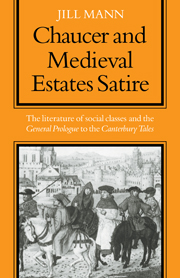Book contents
- Frontmatter
- Contents
- Preface
- List of Abbreviations
- Note on References
- 1 Introduction
- 2 The Anti-Clerical Tradition in Estates Satire
- 3 Estates Ideals
- 4 The Omission of the Victim
- 5 Independent Traditions: Chivalry and Anti-Feminism
- 6 Descriptive Traditions: Beauty and the Beast
- 7 ‘Scientific’ Portraits
- 8 New Creations
- Excursus: The ‘General Prologue’ and the ‘Descriptio’ Tradition
- 9 Conclusions
- Appendices
- Notes
- Selected Bibliography and List of Works Cited
- Index
- Frontmatter
- Contents
- Preface
- List of Abbreviations
- Note on References
- 1 Introduction
- 2 The Anti-Clerical Tradition in Estates Satire
- 3 Estates Ideals
- 4 The Omission of the Victim
- 5 Independent Traditions: Chivalry and Anti-Feminism
- 6 Descriptive Traditions: Beauty and the Beast
- 7 ‘Scientific’ Portraits
- 8 New Creations
- Excursus: The ‘General Prologue’ and the ‘Descriptio’ Tradition
- 9 Conclusions
- Appendices
- Notes
- Selected Bibliography and List of Works Cited
- Index
Summary
How are we to describe the General Prologue to the Canterbury Tales? What does it tell us about the society it represents? It seems rather late in the day to ask these questions. For no one could claim that the Prologue has suffered from a lack of critical attention; on the contrary, it has long been praised as the consummate achievement of Chaucer's art.
The enthusiasm ostensibly generated for the whole of the Prologue often proves, however, to be excited by the few characters who provide a focus for a critic's particular interest, whether this is in their comic aspects, their psychological complexity, or the moral significance attached to them. Study of the Prologue has too often meant a series of partial approaches, based on the figures who most conveniently offer themselves for character analysis, or for investigation of possible historical prototypes, or for interpretation according to the conventional iconography of medieval art or science. So it does not seem redundant to attempt to analyse the character and meaning of the Prologue as a whole.
In the pages that follow, I shall be claiming that the Prologue is an example of a neglected medieval genre – that both its form and its content proclaim it to be part of the literature dealing with the ‘estates’ of society.
- Type
- Chapter
- Information
- Chaucer and Medieval Estates Satire , pp. 1 - 16Publisher: Cambridge University PressPrint publication year: 1973



